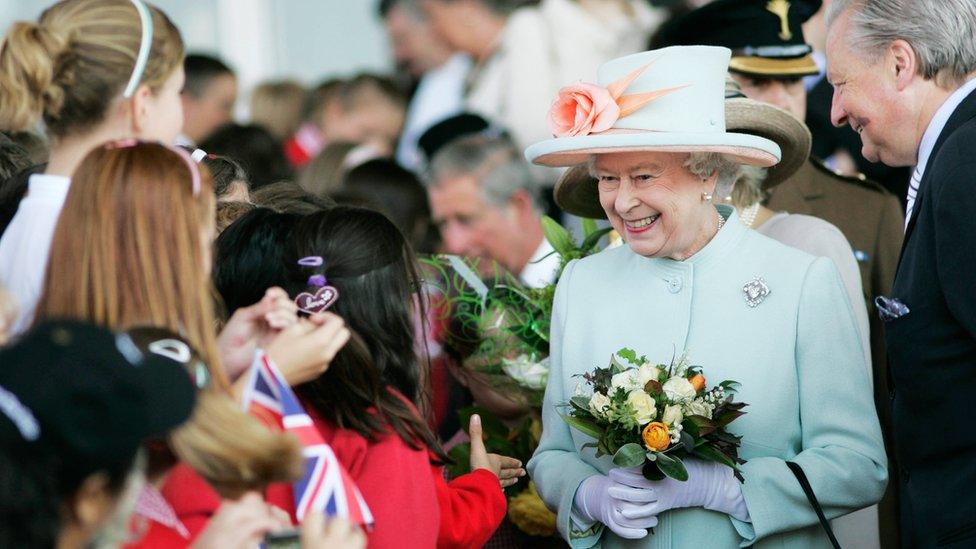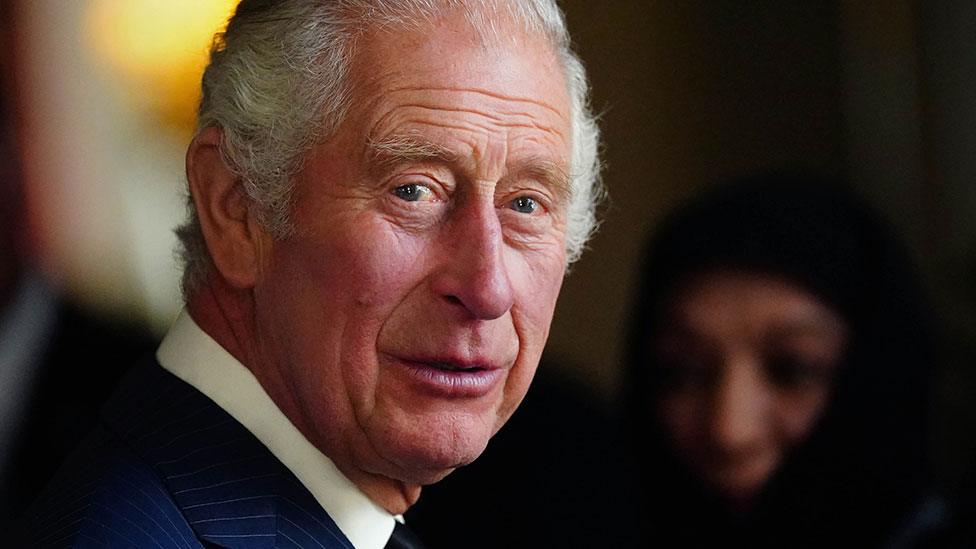Queen Elizabeth II: How monarch helped shape modern Wales
- Published
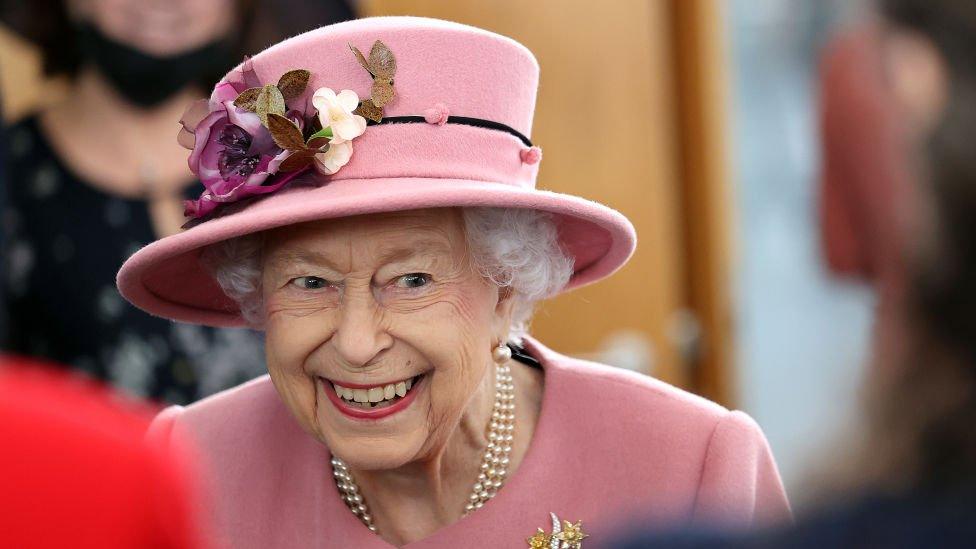
The Queen's last visit to Wales was in October 2021 when she officially opened the sixth Senedd term in the Welsh Parliament
The Queen's unwavering service in Wales bears testament to how effectively the monarchy has interacted and adapted with people over the past nine decades.
Scratch the surface of the endless stream of public engagements and it becomes clear how much impact she had on the nation and the genuine connection she had with its people and their way of life.
While it is widely acknowledged that her political power is ceremonial, it belies the fact that her role rose to greater prominence after devolution, a process with which she had actively become deftly and diligently interwoven.
There were also the more difficult times when it came to her duty in Wales; one in particular that is said to have been one of the biggest regrets of her reign.
And what is believed to be another first for her reign unfolded in Wales, when the monarch was forced to abandon an official engagement due to security fears.
Examining her relationship with Wales, the same themes are often repeated by friends, those who served and worked with her and those who welcomed her into their communities - a tireless devotion to duty, a keen, informed mind and a wry sense of humour.
Queen Elizabeth II was the UK's longest-serving monarch and reigned for 70 years
A country woman at heart, the Queen - who celebrated her 96th birthday in April - was said to have felt a great affinity with the Welsh farming community; a relationship that at times would have the monarch erupting into laughter.
Dame Shan Legge-Bourke, Lord Lieutenant of Powys - whose family estate is Glanusk Estate in Crickhowell - is a trusted confidante of the Royal Family.
Her daughter Tiggy was nanny to the young princes William and Harry.
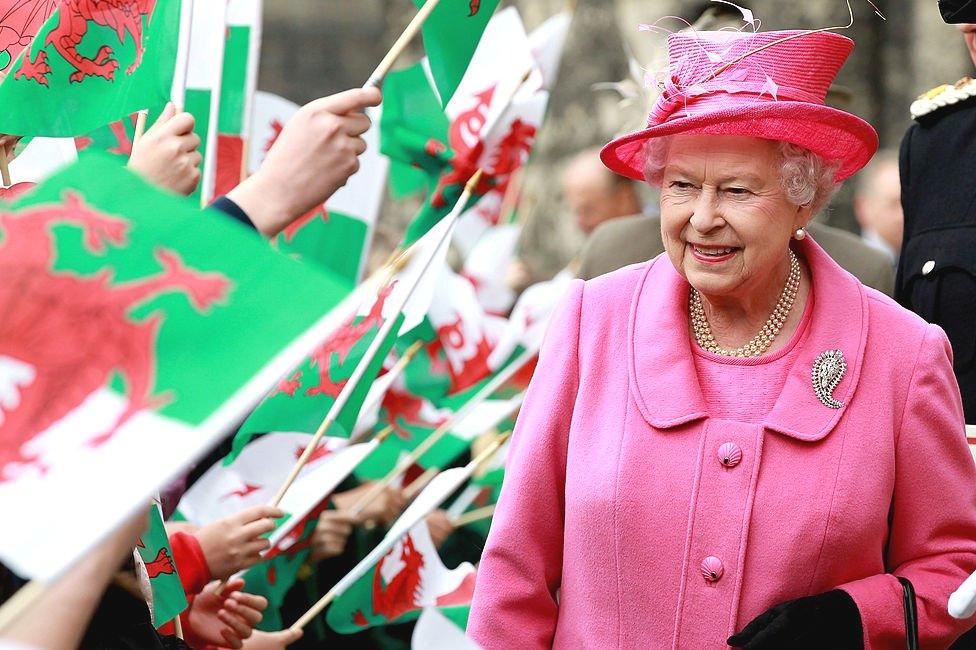
Queen Elizabeth II was cheered by school children with flags as she arrived at Caernarfon Castle in 2010
"She was very much a country woman," Dame Shan said, explaining that the Queen always seemed to feel at home during visits to Powys, an expansive county covering mid Wales which is predominantly rural and agricultural.
"The Queen visited the Royal Welsh Show quite a few times, once with me in its centenary year.
"She had a wonderful affinity with country people."
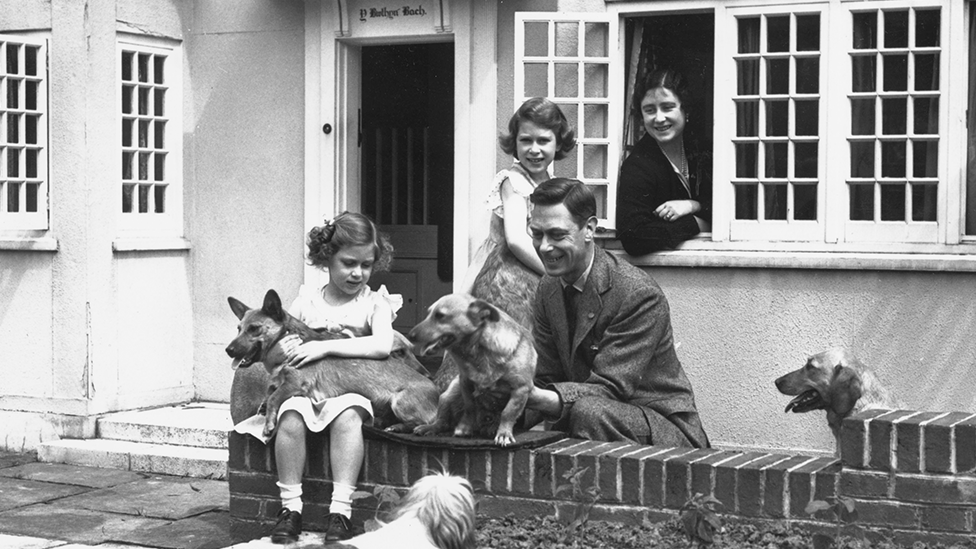
Childhood influence: King George VI and Queen Elizabeth with Margaret (left) and Elizabeth at Y Bwthyn Bach (small cottage) in the grounds of Windsor Castle, presented to the princesses by the people of Wales in 1931
"There was a wonderful scene I recall when she was talking to a gentleman called Mr Picton Jones - a popular figure and show champion for poultry who was known as 'Mr Cockerel'.
"He just made her laugh so much and she was so natural with him."
But humour and levity never came at the expense of duty. The Queen, who was Britain's longest reigning monarch, was described as being punctilious about protocol.
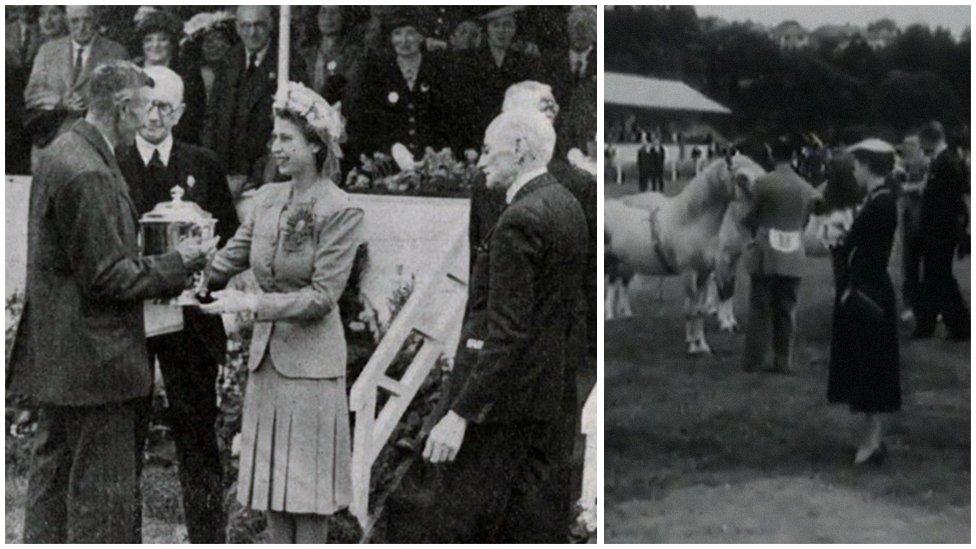
The Queen visited the Brecknock Agricultural Society show on a tour to Wales in August 1955
"On one occasion I met the Queen at Cardiff Airport and I was part of the royal cavalcade," recalled Captain Sir Norman Lloyd Edwards, who in his role as Lord Lieutenant of South Glamorgan from 1990 to 2008, worked closely with and looked after the Queen during visits to the area.
"I was in a car with the police chief constable leading the cavalcade, in front of the royal car and a stream of other vehicles for police, ladies-in-waiting and so on.
"It was a boiling hot day and after we left the airport we took our caps off, putting them back on just as we were entering Cardiff.
"Whilst we were having drinks later the Queen's equerry approached me and said 'you took your caps off in the car'. I said yes, explaining that it had been very hot.
"'The Queen noticed,' he added. "You were still in theory in the presence of Her Majesty.
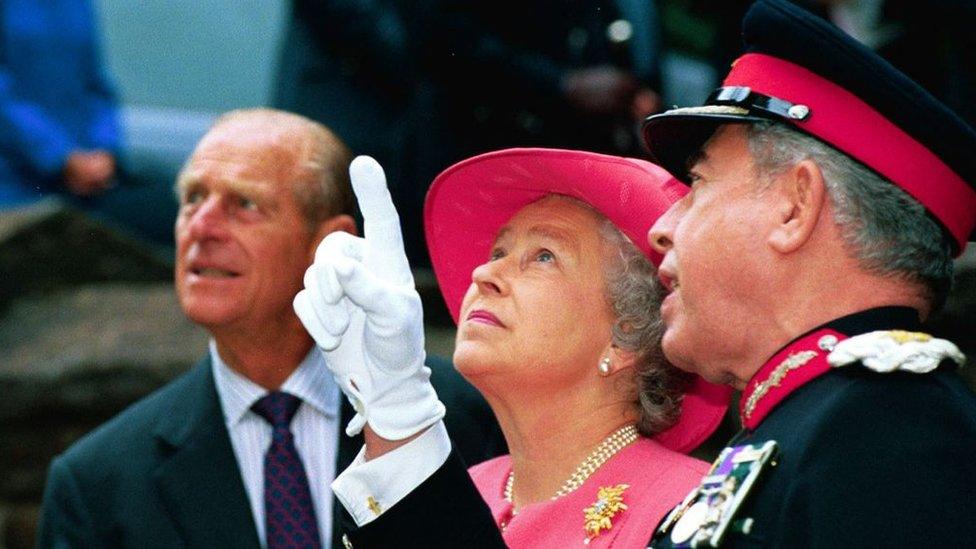
Captain Sir Norman Lloyd Edwards, who served as Lord Lord Lieutenant of South Glamorgan for 18 years, helped plan royal visits to south Wales
"I think you have to be a stickler for these sorts of things as there is a danger of things going sloppy. I heard that during the changing of the guard, the Queen watched it and if something was wrong a message was sent. Being perfect 99% of the time wasn't good enough, it had to be absolutely right.
"She had to maintain that posture otherwise it all got slap-happy and before you knew it you would have had people slapping you on the back. There had to be this mystique. Without that there was no point."
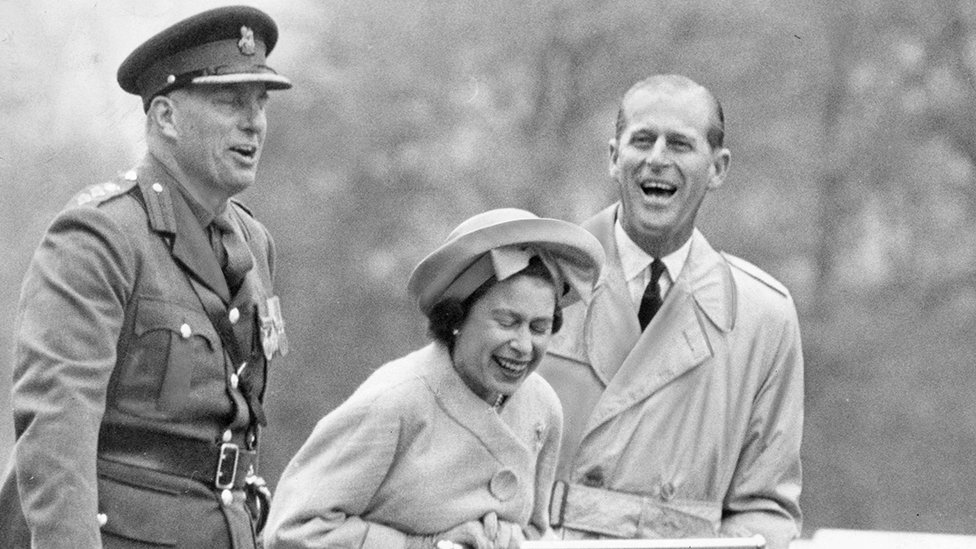
A young Queen and the Duke of Edinburgh at Cwrt-y-Gollenin British Army training base near Crickhowell, in Powys, in May 1963
But on another occasion where protocol had been unwittingly breached, the Queen was quick to see the humorous side.
"I had organised a lunch which the Queen was attending," Sir Norman said.
"To my horror a lady sitting next to me turned to me and whispered 'my husband is drinking the Queen's wine'.
"And I thought 'what do I do?' So I just said 'I think you're drinking the Queen's wine sir'. The poor man was mortified.
"The Queen said 'oh, I thought I hadn't drunk that much', and the whole place erupted into laughter. It broke the ice like nobody's business. She laughed a lot. There was always a smile actually. She had a great sense of humour."
Darkest chapters
In stark contrast to more jovial times, in 1966 the Queen made a visit to Wales during one of the darkest chapters in the nation's history.
A mountain of coal waste slid down a mountainside and engulfed Pantglas Primary School and a neighbouring row of terraced houses in the mining village of Aberfan in south Wales.
A total of 116 children and 28 adults were killed.
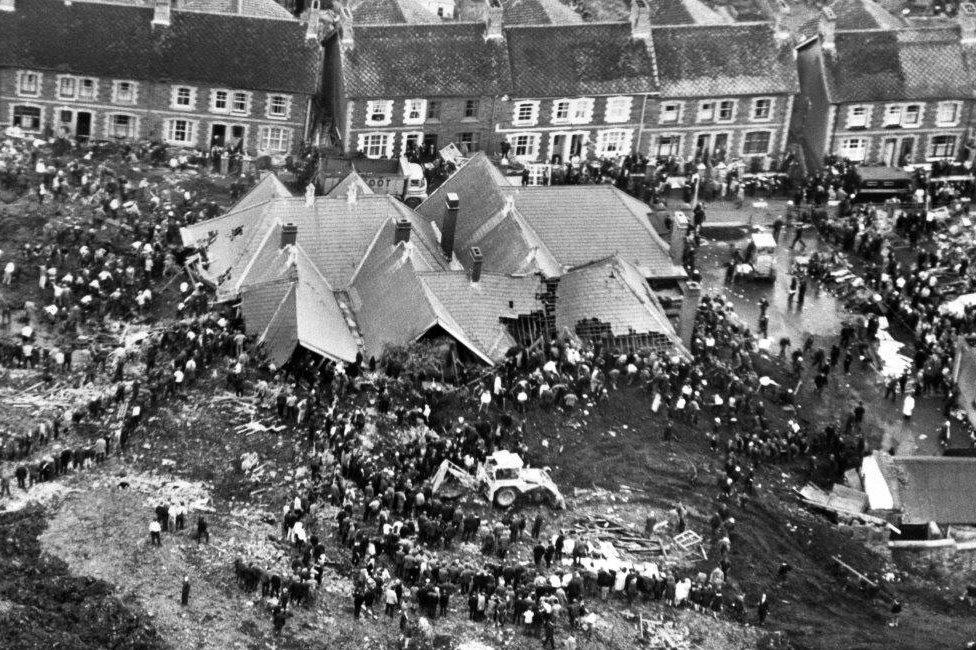
Rescuers dug for days for trapped children after the spoil tip engulfed Pantglas Junior School
A generation of children had been wiped out in their classrooms; one of the first major news events to be televised, the world looked on in horror.
Prince Philip, Lord Snowdon and the then prime minister Harold Wilson had arrived on the scene the following day.
The Queen then visited mourning parents in the village a week later, shortly after a mass funeral had taken place.
Years later the Queen's former private secretary, the late Lord Charteris, was in conversation with author and former Conservative MP Gyles Brandreth and he was asked if she had ever put a foot wrong. He immediately replied: "Aberfan."
He said he felt he had given the Queen poor advice.
"We told her to stay away [from Aberfan] until the preliminary shock had worn off," he said, adding that it was the biggest regret of her reign.
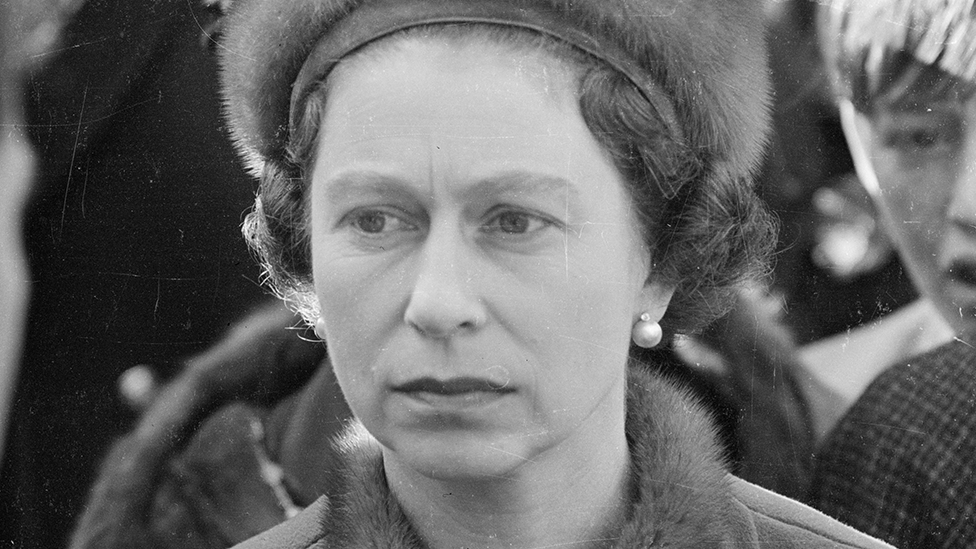
The Queen visited mourning families in Aberfan and forged a close relationship with many of the grieving parents
Jeff Edwards - the last child to be rescued from the school who the Queen always referred to as "the little boy with the blond hair" - was emphatic; there was nothing to regret and he insisted her timing was correct.
"To have come to Aberfan any sooner wouldn't have been appropriate," he said.
"The trouble with any royal visit is that you have an entourage and it just takes over and the rescue work was still on-going.
"Snowdon and the duke and Harold Wilson had come down and reported back in detail to the Queen who came down a week later.
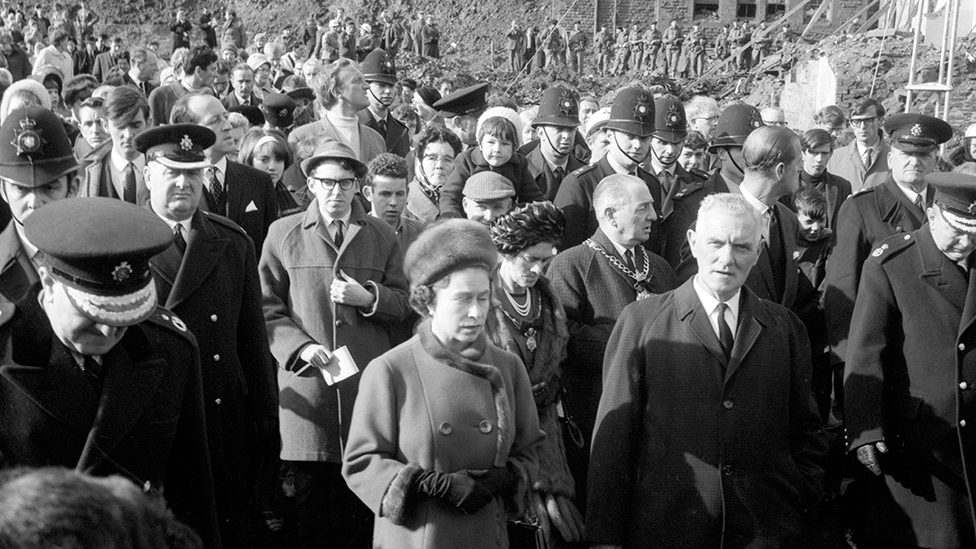
The Queen at the site of Pantglas Junior School, on her right was Councillor Jim Williams, who lost seven members of his family
"To have come down any earlier would have added to the utter confusion. I think when she did come down it was appropriate.
"The funerals had taken place and I remember she'd climbed the hill to the cemetery. She too was a young mother and she was visibly upset and she walked down from the cemetery to a local house.
"When she went into that house she was really upset and she had to compose herself before she went on to meet the relatives and families who had lost children and relatives."
Mr Edwards, who went on to serve as the mayor and leader at Merthyr Tydfil County Borough Council, added: "What came over was her heartfelt sympathy for their loss as she was a young mother herself, and her interest in how they were overcoming that loss in such a public way.
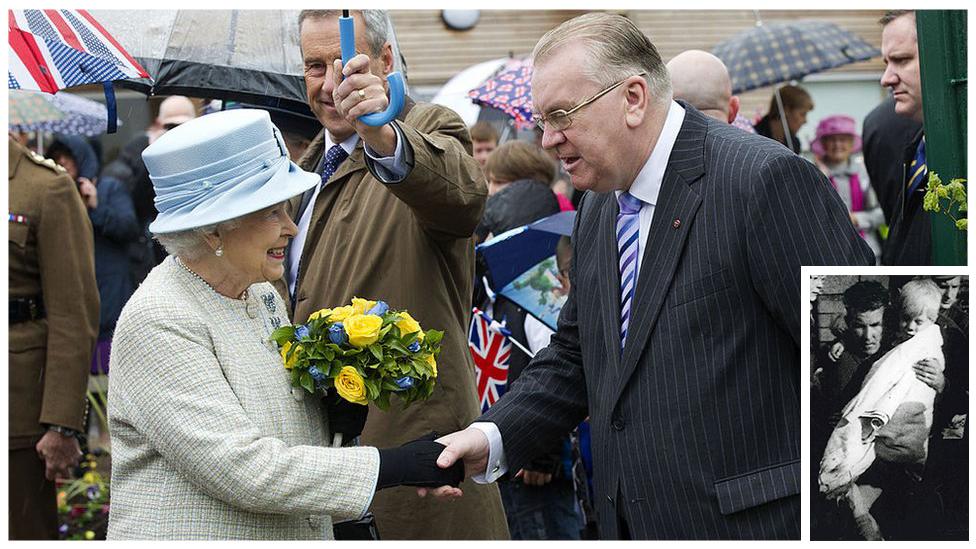
Jeff Edwards welcomed the Queen to Aberfan in 2012
"She was interested in the attention that the media had put on them and how they were coping with that.
"Some said it didn't matter who came as they were so overcome with the pain of what had happened.
"Others felt comfort from the fact that the Queen, who was the head of state, had come to a small mining village and had shown direct interest and concern for her subjects who had gone through this enormous event.
"The whole visit had an immediate impact on her in terms of what she saw, who she met and remained with her for the rest of her life."

The Queen chatted with mothers who lost children in the Aberfan disaster, Marjorie Collins, Elaine Morgan and Jean Gough, during her visit to officially open Ynysowen Community Primary School in April 2012
The feeling was mutual for many.
Marjorie Collins, whose eight-year-old son Anthony Wayne died in the tragedy, said the Queen's visit had helped the community.
"They were above the politics and the din and they proved to us that the world was with us, and that the world cared," she said.
The relationship forged with many of the bereft mothers, the majority of whom have since died, remained strong and the Queen visited Aberfan a number of times during her reign.
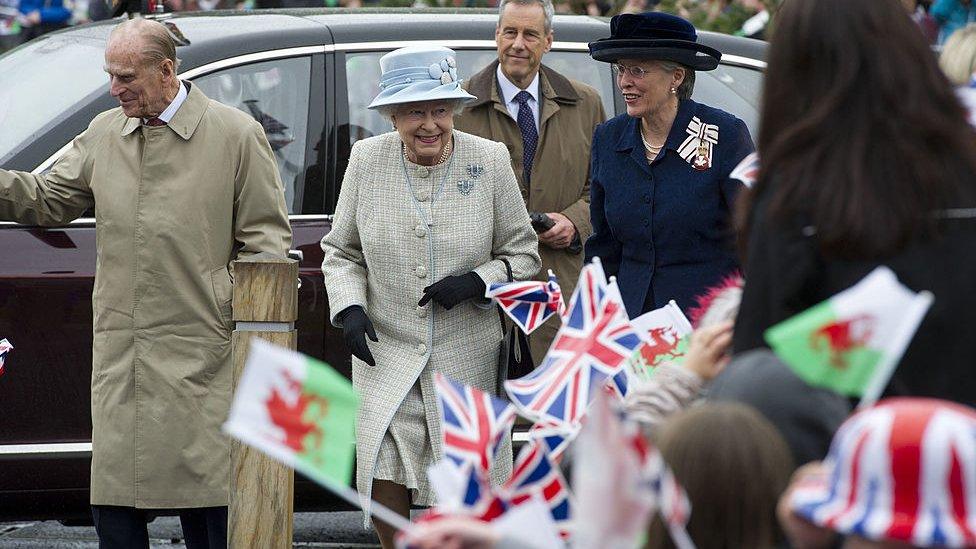
The Queen - pictured arriving for the fourth time in Aberfan - always had a connection with the community
While her association with Aberfan did not wane over the years, there were other areas which did not hold such fond memories for supporters of the Queen.
Wales is credited with providing what is believed to have been another first in her reign when the Queen was forced to abandon an official engagement in Aberystwyth in mid Wales in 1996 due to a security issue.
A group of students and Welsh Language Society members broke through a security cordon of about 50 police officers shortly before the royal car was due to arrive at the town's university.
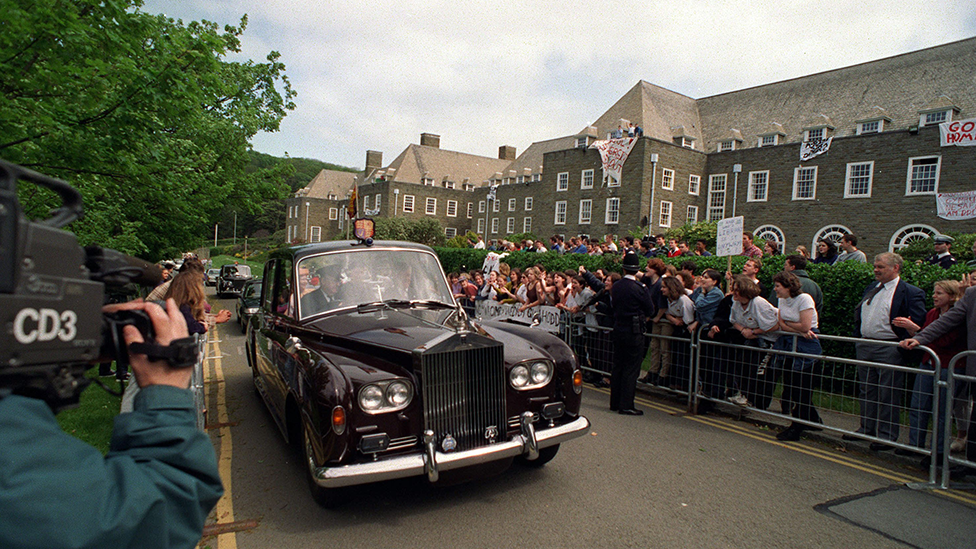
The Queen was forced to cut short her visit to Aberystwyth for her own security
Buckingham Palace security advisers and senior police officers advised the Queen to cancel her remaining engagement after 200 demonstrators gathered on the university campus chanting anti-royal slogans and waving banners.
"The Queen wouldn't have been very happy," Captain Sir Lloyd Edwards said.
"I think she would have been annoyed that people hadn't appreciated the level of anti-royal feeling that prompted the students to put on that demo.
"That should have been picked up well in advance."
Security fears had also been a factor in the investiture of Prince Charles as the Prince of Wales, at a ceremony attended by 4,000 people at Caernarfon Castle in north Wales in July 1969.
On the eve of the ceremony - watched live by millions on TV - two members of Mudiad Amddiffyn Cymru (Movement for the Defence of Wales) were killed as they planted a bomb outside government offices in Abergele.
Press reports at the time said the two men who were killed had set off with the "apparent intention" of placing the bomb near the route of the train carrying members of the Royal Family.
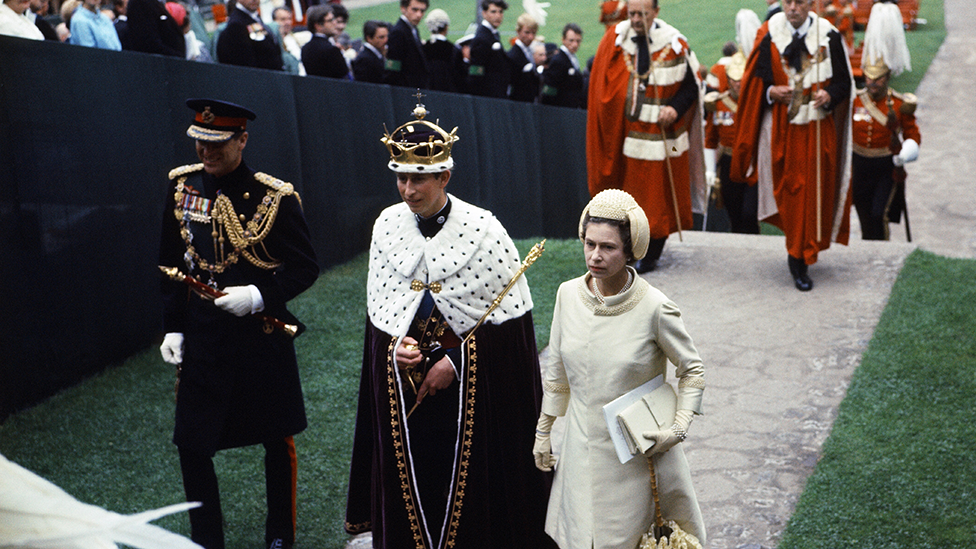
Her Majesty Queen Elizabeth II and her son Prince Charles at his Investiture Ceremony
The late John Jenkins, a former leader of Mudiad Amddiffyn Cymru, later said: "I've made it clear all along that there was no threat to the prince at all."
While often having to navigate the political atmosphere of the country during her reign, the Queen's advisers always insisted that she was "above politics".
But when it came to devolution in Wales, Lord Dafydd Elis-Thomas, one of Wales' most prominent and influential political figures - former MP, Plaid Cyrmu leader, assembly presiding officer, chair of the Welsh Language Board and life peer - would disagree.
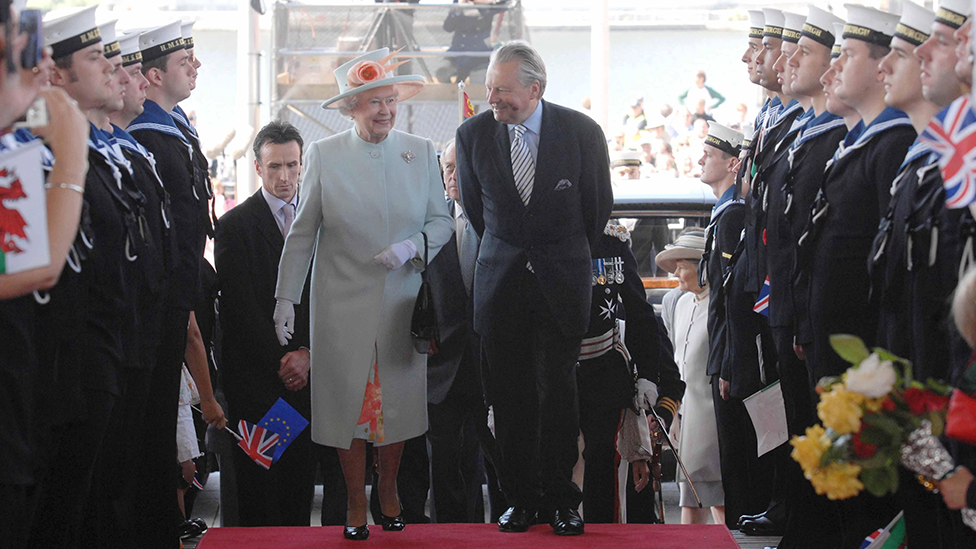
Lord Dafydd Elis-Thomas accompanied the Queen for the assembly opening in 2007
Referring to Queen Elizabeth I of the Welsh royal dynasty the Tudors, who is said to have regularly spoken Welsh at court, he remarked: "I always say there was one Queen Elizabeth who saved the Welsh language and there was another one who gave Wales devolution."
And her acknowledgement of "historic national identities" was not a recent thing.
In 1976, Jim Callaghan's government did not have a majority and was vulnerable to pressures from the Scottish National Party and Plaid Cymru.
Following much political wrangling, in 1977 separate Bills were introduced for Wales and Scotland, paving the way for devolution referenda.
In her Jubilee Speech to Parliament that year, the Queen addressed the matter.
"The problems of progress, the complexities of modern administration, the feeling that metropolitan government is too remote from the lives of ordinary men and women, these among other things have helped to revive an awareness of historic national identities in these Islands," she said.
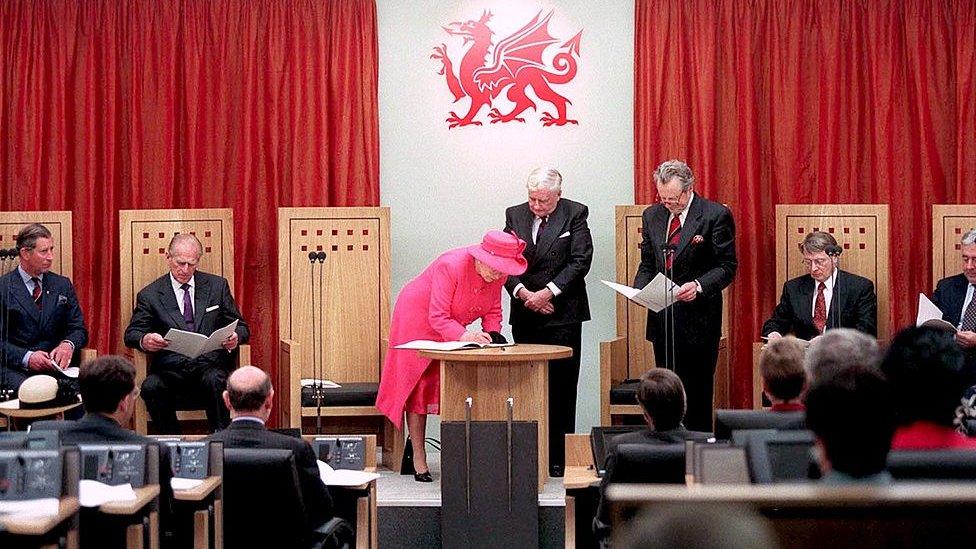
Queen Elizabeth signed a special edition of the 'first words' Act before presenting the bound volume to the Welsh Assembly as a symbol of the new relationship between Westminster and Wales
"They provide the background for the continuing and keen discussion of proposals for devolution to Scotland and Wales within the United Kingdom.
"I number Kings and Queens of England and of Scotland, and Princes of Wales among my ancestors and so I can readily understand these aspirations.
"But I cannot forget that I was crowned Queen of the United Kingdom of Great Britain and Northern Ireland."
That last line, Lord Dafydd Elis-Thomas points out, was done to balance her acknowledgement of devolution and said in not so many words, 'come what may, I am still your Queen'.
Those words were to prove prescient.
Twenty years later in 1997, a referendum returned a narrow majority in favour of devolution in Wales.
Lord Elis-Thomas, who was made the assembly's presiding officer, was in close contact with the Queen and her advisers regarding the opening ceremony.
On 26 May 1999, the Queen arrived in Cardiff in an open-top carriage along with the Duke of Edinburgh and Prince Charles for the opening at the assembly's initial home at Crickhowell House.
Inside she signed a special edition of the Government of Wales Act, which symbolised the transfer of powers from Westminster to the assembly.
It would, the Queen said, extend a bridge into the future, a beginning and an opportunity.
"This opening today marks a new and significant direction in the way Wales is governed," she said. "It's a moment of renewal true to the spirit of Wales."
The Queen attended all six opening ceremonies, each ceremony developing as the assembly bedded down in to its new home at the Senedd in Cardiff Bay, which she also opened in 2006.
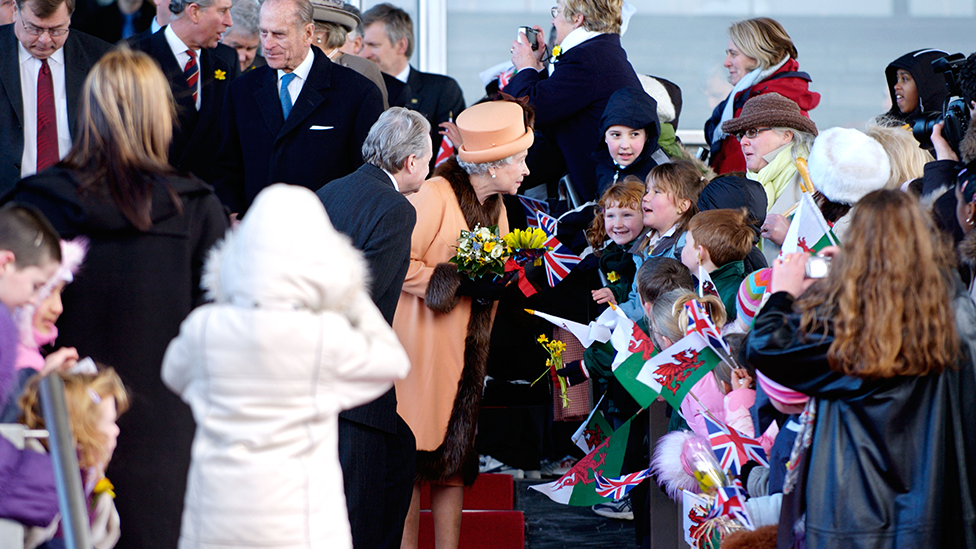
The Queen chatted to schoolchildren at the royal opening of the Senedd in 2016
"From the very beginning the Queen was here to give her royal blessing to the institution," Lord Elis-Thomas said.
"It was saying 'I'm behind this' and she embraced it fully. She would perform the duty of opening of the assembly on a par with the state opening of Parliament.
"It was about using all the ceremony that surrounds the Queen as part of the celebration of devolution. She was speaking as the head of state which was changing along with devolution.
"That was something she was fully advised about and fully agreed with."
In fact, the Queen's last visit to Wales was to officially open the sixth Senedd term at the Welsh Parliament last October.
Addressing the Senedd, the Queen paid tribute to those who rose "so magnificently to the challenges" of the Covid pandemic.
"They are shining examples of the spirit for which the Welsh people are so renowned, a spirit which I have personally encountered so many times," she said.
"It is a source of pleasure that both the Prince of Wales and the Duchess of Cornwall, together with the Duke and Duchess of Cambridge, have had homes in Wales, and experienced its very special sense of community.
"The Welsh people have much to be proud of."
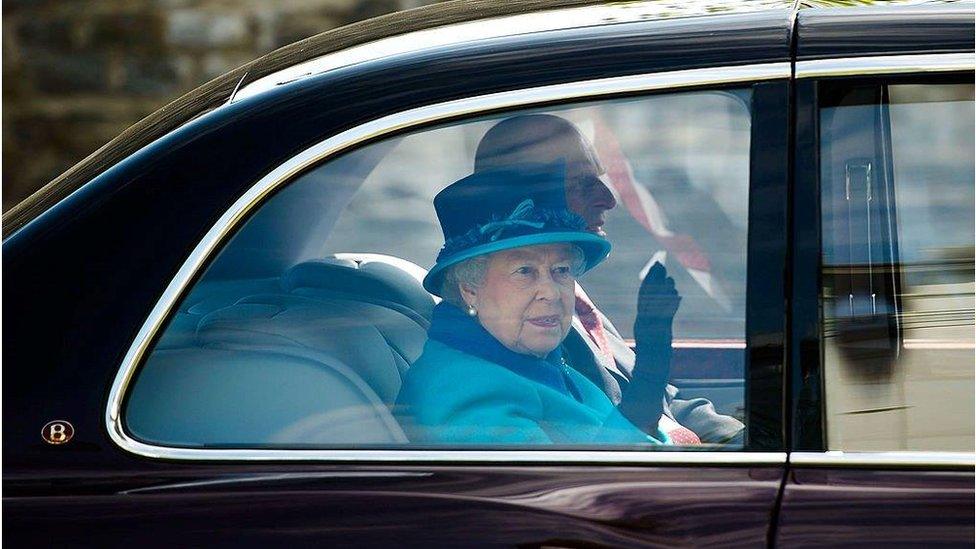
The Queen and Prince Philip visited Pembroke Dock 2014
But far beyond the pomp and ceremony, the Queen will also be remembered by so many who knew her well for being impeccably well informed and up to date and someone who frequently demonstrated a down-to-earth approach to life.
"I always thought she was the most well informed woman in the world. She really was," said Dame Shan.
"Everyone had the view that she didn't watch the TV, listen to the radio, listen to the news. Oh yes she did. She knew what was going on only too well. Both good and bad. She had a tremendous character.

The Queen and the Duke of Edinburgh during a tour of RAF Valley in 2011 where grandson Prince William was stationed as a search and rescue helicopter pilot
"We had an event called the Powys Picnic in Dolau, mid Wales, in 2012 which 10,000 school children attended. You'd never seen anything like the mud. I mean, Glastonbury eat your heart out!
"I remember saying to her at one point 'it's really muddy there, shall we move on?'. 'No, I love seeing the gun dogs,' she said. "She was very game.
"I saw her about two months after that event, we were at a reception somewhere. She caught my eye and literally picked her feet up comically as she was walking towards me as if she was walking through mud as if to say 'I won't forget the mud'. She had a great twinkle."
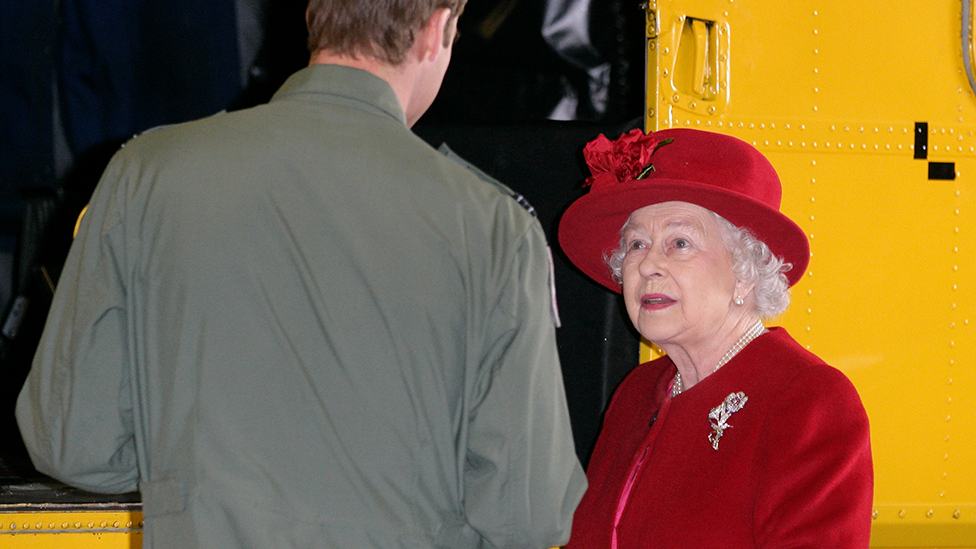
The Queen was shown around RAF Valley in 2011 by grandson Prince William
For those who did not know her, the Queen will be remembered for her sense of duty, a commitment to the throne which never waivered, a commitment which saw her touch communities right across Wales.
For Captain Sir Norman Lloyd Edwards, it was more than a sense a duty, it was "a passion".
"The monarchy was her life," he said.
Queen Elizabeth II died, aged 96, at her Scottish estate Balmoral on Thursday.
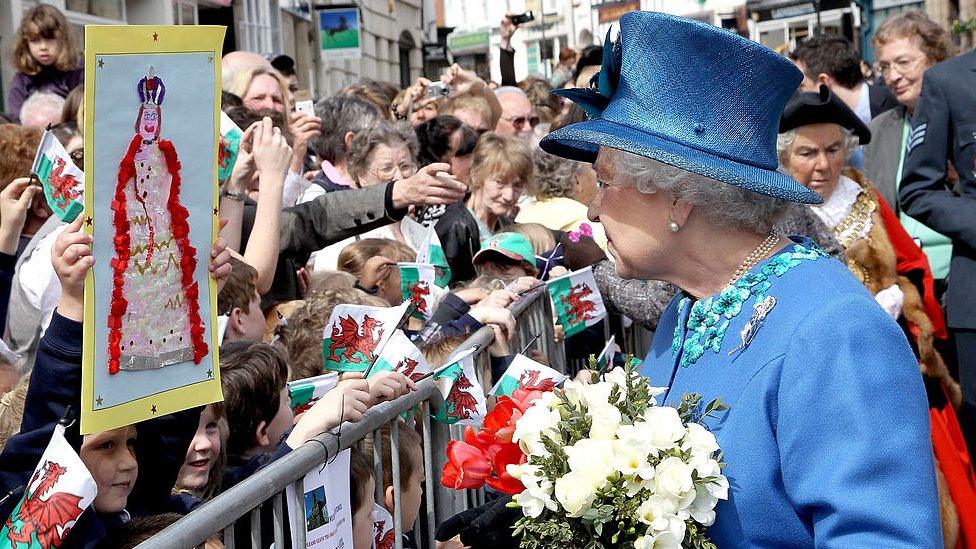
The Queen enjoyed meeting children on a tour to Welshpool in 2010
Related topics
- Published8 September 2022
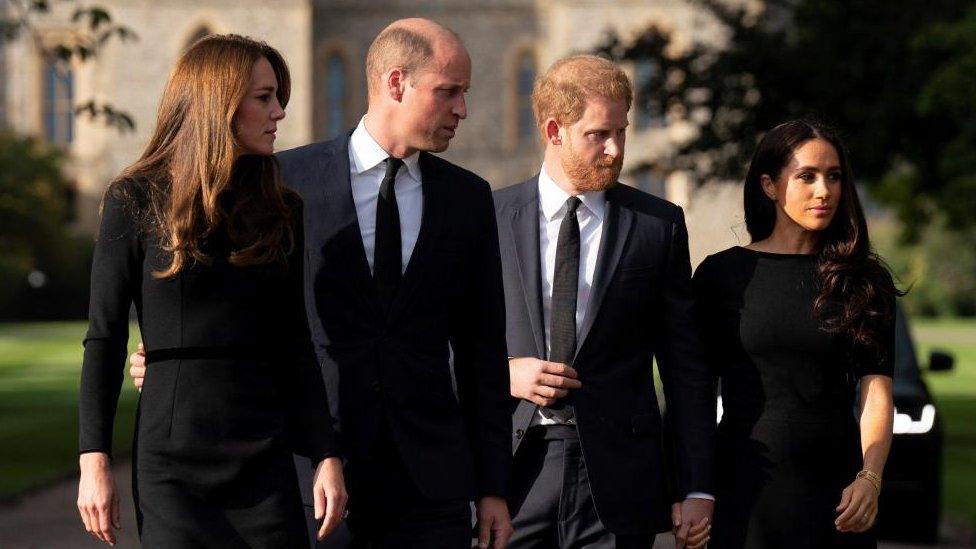
- Published8 September 2022
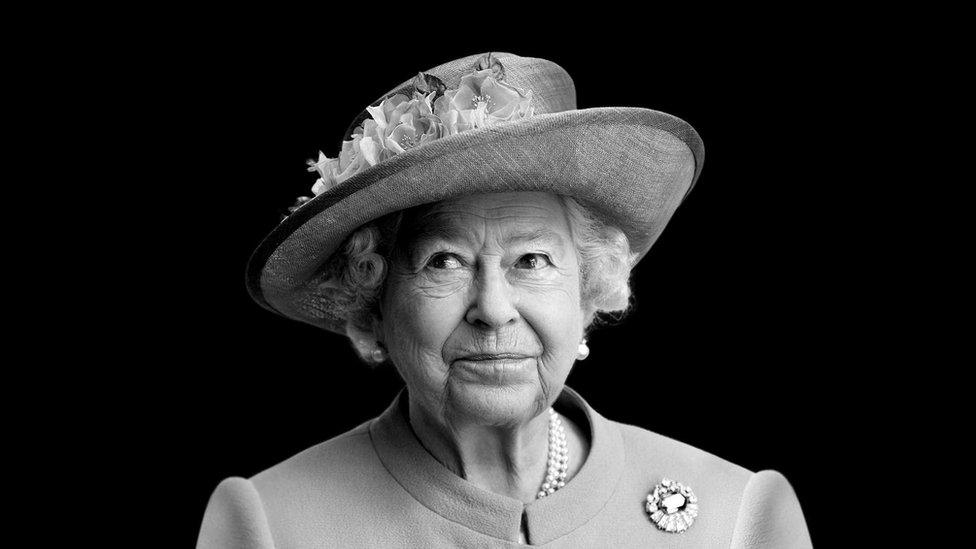
- Published8 September 2022
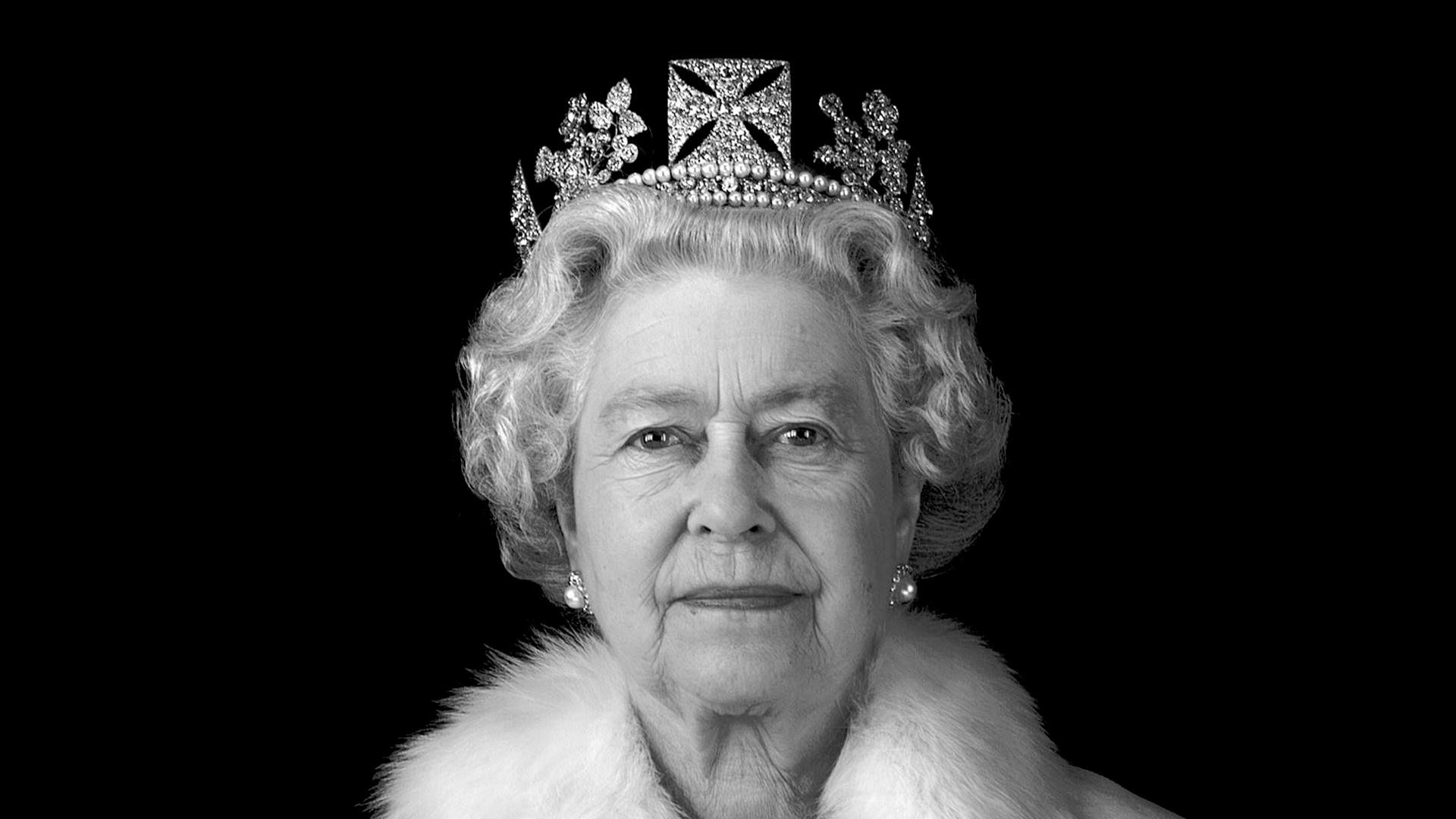
- Published1 March 2024
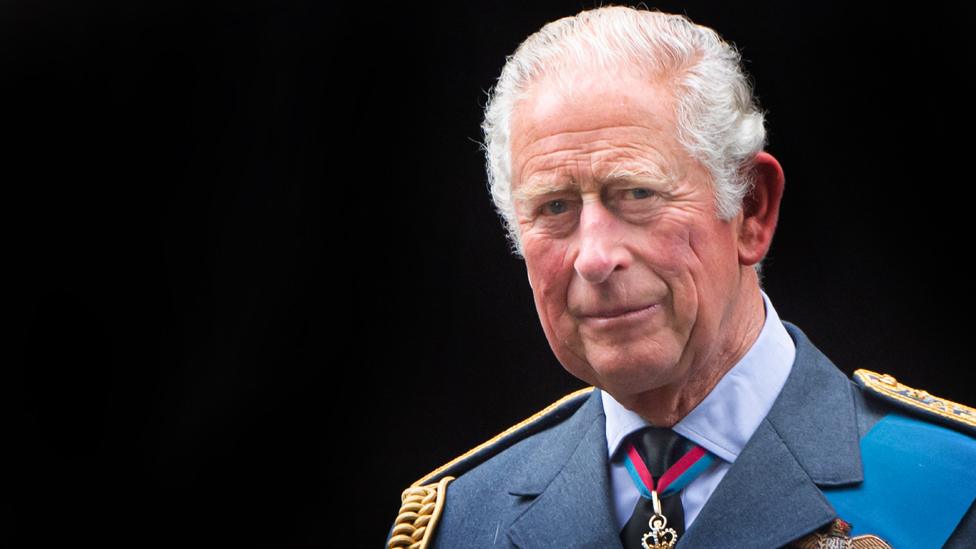
- Published8 September 2022
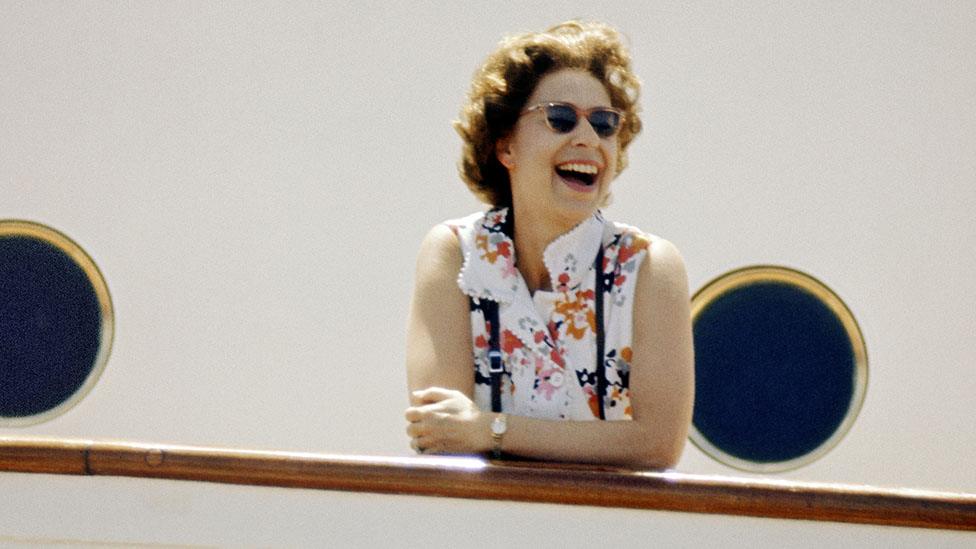
- Published8 September 2022
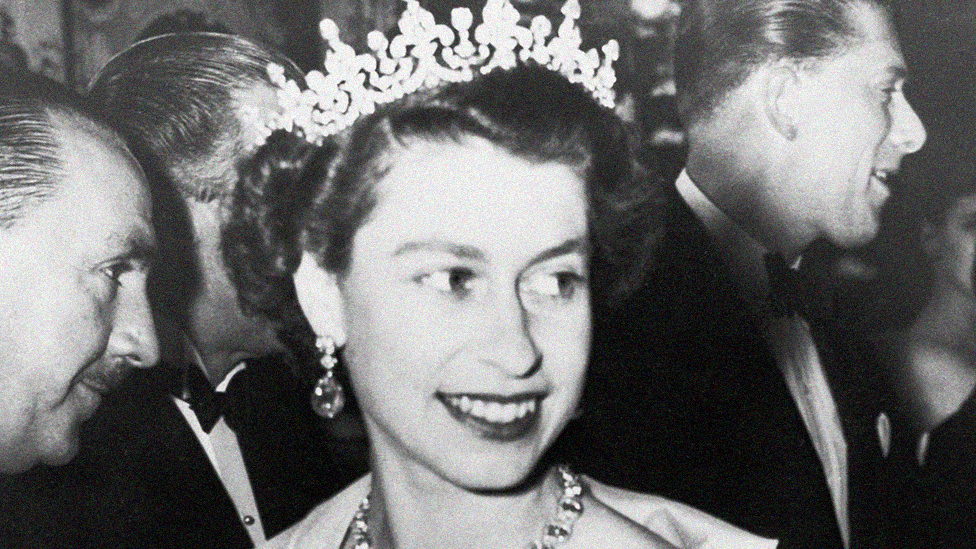
- Published8 September 2022
